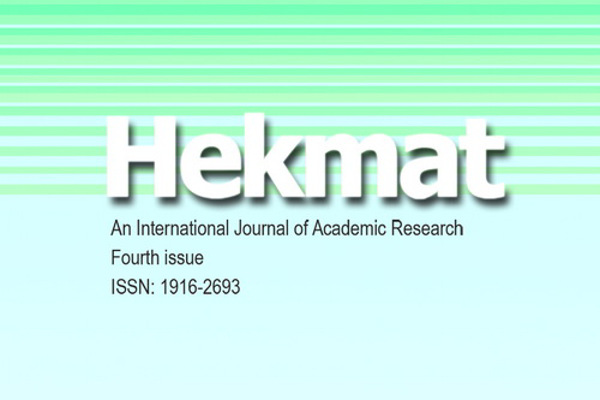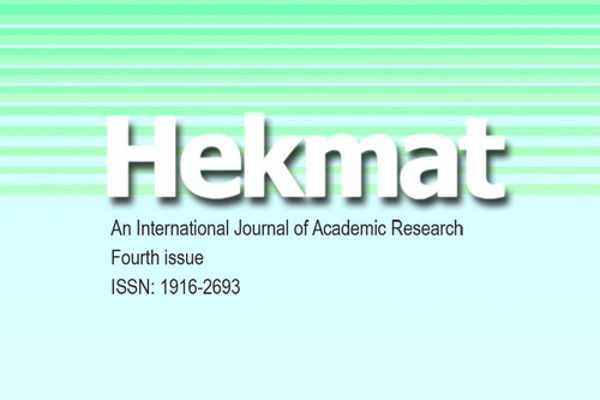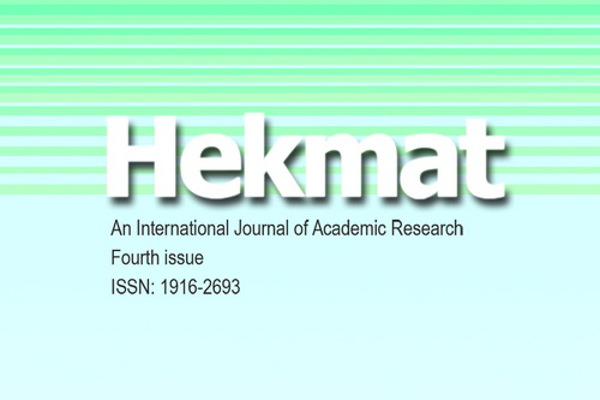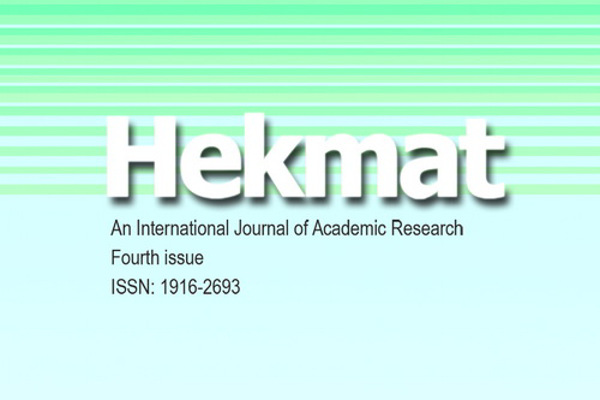Law the Guarantee for the Protection of Human Rights / By: Mortaza Beheshti
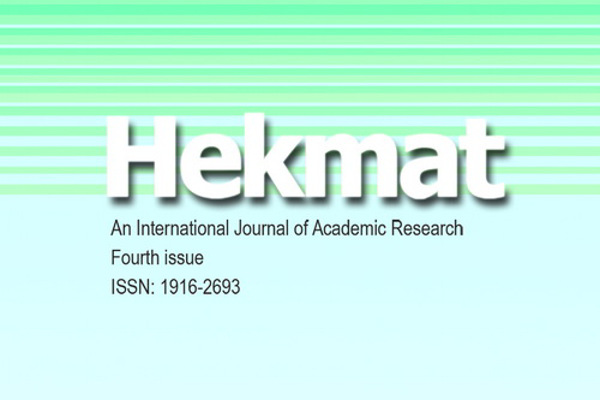
Law
the Guarantee for the Protection
of Human Rights
Mortaza Beheshti[1]
Abstract
Human Rights are shared ideals among all world nations such that there cannot be found an era in the history of man, even during the periods of slavery and barbarism, in which the issue of the rights of man has not been a concern. It is, therefore, immediately evident that human rights should be considered man’s real and all-embracing demand throughout history.
Hence, human rights activities have always been welcomed by nations, and human rights violators of all times have pursued their inhuman targets and desires disguised as the establishment of human rights and have always tried to impose their ill intentions and enmity against humanity hidden, wrapped in acts of philanthropy. This is itself telling as to the depth of the penetration of the Principle of Human Rights into various social strata, which is undeniably evident even for those who would choose to disagree and are still in denial.
Thus, passing the Universal Declaration of Human Rights on December 10, 1948, all member states of the United Nations Organization showed great respect and admiration for it. This declaration counts as the most significant legal instrument in the world and, by extension, its unparalleled principles have served as a model in the drawing up of treaties, declarations, conventions, and international and national laws, influencing nations in regulating their constitutional and ordinary laws.
This paper does not aim to recount the undisputed principles which have so far been sufficiently discussed and covered by other researchers worldwide. Rather, the topic put forward for discussion here is the role that the law and obedience to it play in guaranteeing the rights of man through the principles “nulla crimen sine lege” (there is no crime except in accordance with the law) and “nulla poena sine lege” (there is no punishment except in accordance with the law). In doing so, the concept of law, human rights, and the prerequisites to law enforcement will all be discussed.
Key Terms
The law, human rights, nulla crimen sine lege, nulla poena sine lege, the rule of “no punishment except in accordance with the law,” the rule of “no punishment when the crime is not absolutely certain” (Dar’)
The Principle of “No Crime and Punishment Except In Accordance With the Law”
“nulla crimen sine lege”
“nulla poena sine lege”
The law, by foreseeing criminal acts and punishments, defines for its general public the characteristic features of criminality. According to “The Social Contract” which the philosophers of the 18th century had in view, society must not punish its citizens or infringe on their right to freedom in cases of dispute or conflict, outside of the limits set out by law.
It is only for the law to draw boundaries of the society’s legal authority and the rights of the individuals as far as it is necessary. Thus, it has been said that “the law must state the public will and not the will of one party only.”
The Principle of “No Crime and Punishment except In Accordance With the Law” and its resultant outcomes gained increasing attention as an international document with the establishment of the United Nations Organization in 1945.
The 1948 Universal Declaration of Human Rights, in articles 9, 10, and 51, the International Covenant on Civil and Political Rights, specifically in articles 9, 14, and 15, and The 1950 European Convention on Human Rights, while explicitly stipulating this principle, set out to stress the importance of the legal anticipation of its provisions and enforcement by local judicial authorities.
Articles 22 and 23 of the 1988 Rome Statute of the International Criminal Court independently anticipated The Principle of “No Crime and Punishment except In Accordance With the Law.”
It is, therefore, evident that the legalization of the penal order which had originally found its way into the internal legal systems of countries, has today found its pride of place in both substance and form in the international penal order.
The Public Penal Code of Iran, enacted in January 1926 and influenced by the French civil law of 1810, has stressed in articles 2 and 6 the necessity of the legalization of crimes and punishments. Also the amendment to the Public Penal Code (1973), while being inspired by achievements in the science of criminology and the modern school of social defense and the effects of both on criminal law, explicitly accepted the principle of “nulla crimen sine lege” in article 2, and the principle of “nulla poena sine lege” along with security measures in article 6. Thus, the security measures, which had entered into Iranian legal system through the enactment of a law in 1960, were accorded a place alongside certain punishments under this general principle.
It goes without saying that the justification and the necessity of obedience to the principle of “no crime and punishment without a law” inevitably creates limitations and at the same time obligations for judges and law makers alike.
The principle of “no crime and punishment without a law” can be counted as the prerequisite for bringing about sufficient human rights guarantees because the legal community, in expressing its statement of indispensability, agrees that:
“Care and clarity in formulation of penal headings should be such that the accused is able to be made fully aware of the exact nature and litigations made against him so as to be able to arrange a defense on the basis of the charges asserted.”
The principle of the “no crime and punishment without a law” creates obligations for judges based on those same assumptions, and their duty is to bring forward legal charges as stated in the law during the process of investigations. Thus, judges cannot, based on local customs, find an act unlawful, or inversely, they cannot withdraw punishment for an illegal act because of it not being considered hideous by the public anymore.
Regarding the handing out of punishments, similarly the judge cannot act according to personal taste or preference, or on the basis of public predilection and custom of place, punishing the innocent or reduce severity of punishment for the guilty.
With the increasing trend of democracy and the tendency to abide by the law at government level, the expansion of the rights and freedoms of the citizens in law-governed governments, and along with the recognition of civil rights as against those of the ruling systems and the necessity of legal support for the protection of those rights, criminal laws strongly stressed, in independent articles, the principle of “no crime and punishment without a law” and also the principles derived from its enactment. For example, the legal article 111-2 of the new French Penal Code, enacted on July 22, 1992, stresses the principle of “no crime and punishment without a law,” article 111-4 emphasizes the necessity of narrow interpretation of criminal laws, and article 112-4 underlines the principle of "Nullum crimen, nulla poena sine praevia lege poenali", which means penal law cannot be enacted retroactively.
After the appearance of Islam and the advancement of religious jurisprudential law and entry of its principles such as presumption of innocence into judiciary justice, discussions regarding the principle of “no crime and punishment without a law” too gained a more serious quality. In order to give supportive proof of claims and their applicability grounds, reference to the holy Quran and the tradition was strongly stressed. This principle has also been pointed out under the rule of Dar’ (no punishment when crime is not absolutely certain) as well as the Islamic rule of “ugliness of punishment except in accordance with a law.”
In order to become acquainted with the position of Islam in relation to the principle of “no crime and punishment without a law,” the following verses are sighted:
{...وَمَا کُنَّا مُعَذِّبِینَ حَتَّى نَبْعَثَ رَسُولًا}
“We shall not punish any tribe before having sent our prophet.”
The holy Quran: al-Isra (The Night Journey): 15
{...لَا یکَلِّفُ اللهُ نَفْسًا إِلَّا مَا آتَاهَا}
“Allah shall not bind anyone to a duty, except to that which He has given them before hand.”
The holy Quran: al-Talaq (Divorce): 7
{...لِیهْلِکَ مَنْ هَلَکَ عَنْ بَینَةٍ وَیحْیى مَنْ حَی عَنْ بَینَةٍ}
“Allah shall perish by manifest proof and live by manifest proof.”
The holy Quran: al-Anfal (The Spoils): 42
{وَمَا لَکُمْ أَلَّا تَأْکُلُوا مِمَّا ذُکِرَ اسْمُ اللهِ عَلَیهِ وَقَدْ فَصَّلَ لَکُمْ مَا حَرَّمَ عَلَیکُمْ...}
“Why should you not eat that over which Allah’s name has been mentioned, while He has already elaborated for you whatever He has forbidden you?”
The holy Quran: al-An’am (Cattle); 119
{وَمَا کَانَ اللهُ لِیضِلَّ قَوْمًا بَعْدَ إِذْ هَدَاهُمْ حَتَّى یبَینَ لَهُمْ مَا یتَّقُونَ...}
“Allah does not lead any people astray after He has guided them until he has made clear to them what they should beware of.”
The holy Quran: al-Towbah (Repentance): 115
In confirmation of the principle of “no crime and punishment without a law,” the narratives from the tradition of Islam can also be referred to. Some of these are as follows:
عن رسولالله| قال: «رفع عن أمتی تسعة أشیاء: الخطاء والنسیان وما استکرهوا علیه وما لا یعلمون...»
The Prophet of God said, “Liability for nine things has been taken away from my people: errors, forgetfulness, the things for which they have aversion and repugnance, and for that which they have no knowledge of.”
«ما حجب الله علمه عن العباد فهو موضوع عنهم»
“Liability for that which God has veiled from man’s awareness has been taken away.”
«الناس فی سعة ما لا یعلمون»
“People are not liable for what they do not know.”
«کل شیء مطلق حتی یرد فیه نهی»
“Everything is allowed as long as it has not been declared forbidden.”
«کل شیء هو لک حلال حتى تعلم أنّه حرام بعینه...»
“Everything is allowable unless you come to a certainty as to its prohibition.”
According to the rule of “ugliness of punishment except in accordance with a law,” so long as an act has not been prohibited by divine law and that prohibition has not been clearly communicated to the subject of legal obligation, in case of him committing such an act, his punishment is deemed as ugly or shameful.
The rule of “ugliness of punishment except in accordance with a law” is a maxim that all jurisprudents and fundamentalists hold as certain. The Shiite researcher Ha’eri Yazdi states, “This is a principle so evident and distinctly certain in Adliyyah School (the Shiite and the Mo’tazelite) in which there can be no doubt.”
The renowned jurisprudent of our time Ayatollah Kho’ee states, “Punishment for an act which is in conflict and disagreement with that which has not been properly clarified as an obligation and not comprehended, is one of the clearest instances of injustice.”
In accordance with the rule of Dar’, in cases where the perpetration of a crime is a matter of uncertainty either by content or by decree, or where its attribution to the accused is not certain, punishment is waived, and in its waiver, there is no difference in uncertainty as to the content of the crime or its decree. The jurisprudential documentation of this rule is the tradition “Waive punishments while in uncertainty” which has been quoted in various forms in both the Imamiyyah and the Sunni traditions.
Many of the old or recent Imamiyyah jurisprudents, especially those living close to the times of the Imams, have held to the rule of Dar’ and in many instances of their jurisprudential deductions, it has been cited as a premise for proof according to which religious decrees have been made.
Another point is that some have wanted to exempt discretionary punishments from the principle of “no crime and punishment without a law,” on the basis of the argument that, since discretionary punishments are, in kind and measure, at the discretion of the judge, they must be free from the obligation that the principle drives at. Even if this view were accepted, in Islamic jurisprudential law, there is restriction set on the maximum limit of discretionary punishments, based on the rule “discretionary punishments must be below the scale of prescribed punishments (Dun ul-Hadd),” whereby the judge is not permitted to act in an unrestricted manner.
In general terms, the Islamic judge cannot punish anyone for a crime, while there has been no exact punishment specified for it, and the interpretation of dictums such as «التعزیر لکل من حرم» (punishments are for those who perpetrate a crime or a forbidden act) and «التعزیر بیدالحاکم» (punishments are left to the discretion of the Islamic judge) refer to the basic issue of permitting worldly punishments for criminal acts and in no way purports to be in a position to pass judgment on the manner of its execution.
According to principle 169 of the Constitution of the Islamic Republic of Iran, no action or omission can be deemed to be a crime based on a law that has been passed after that action or omission. Also principle 36, with recourse to a specific type of interpretation of the principle of “no punishment without a law,” stipulates that a sentence of punishment can only be passed by a competent court of trial and based on the law.
The latter part of this principle, refers to the principle of “no punishment without a law” and the earlier part refers to the principle of the judicial legitimacy of punishments which itself is a complement to the latter principle, that is, only competent courts have the right to pass and enforce legal sentence.
In regulating principle 167 in section 11 of the Iranian Constitution, relating to the judiciary, the instituting body of experts regulating the constitution has added a novel interpretation of the principle of “no crime and punishment without a law” to the other common principles relating to its various dimensions. According to this principle, “the judge is obliged to make an effort in finding the sentence for each crime within the body of codified laws, and if he does not find a specified sentence, then recourse must be made to valid Islamic sources or jurisprudential decrees in determining the verdict, and he cannot refuse to pass judgment resorting to pretexts like silence of the law, its brevity and obscurity, or its being in contradiction to the existing body of law.”
Of course, the majority of legal advisers know the substance of this principle to be dealing with civil lawsuits and believe that, without doubt, the primary intention of the original prescription made by the underwriters of the constitution has not been to violate the rights of individuals by extending the scope of this principle to criminal affairs, thus giving unrestricted authority to judges and disciplinary agents to take action against them.
However, the ordinary law legislator chose the opposite interpretation and, in some criminal laws and regulations, adopted the exact same principle or its subject matter without determining its restrictive applicability within the boundaries of valid Islamic sources or jurisprudential decrees. Therefore, up until the entry of the substance of principle 167 into ordinary law, courts of law invoked to that same principle (without its restrictions) and, basing their judgments on jurisprudential sources and decrees, passed verdicts on acts which were not explicated by ordinary law as having criminal implications. Thus, sentences of punishment were passed whereby this type of indiscriminate obliquity of judgment put the judicial essence and spirit into disequilibrium with the principle of “no crime and punishment without a law.” The Iranian legal society knows such trends to be the ground for obstinate denial of human rights.
Challenges Facing the Advancement of the Principle of “No Crime and Punishment Without a Law”
As was stated in previous lines, the principle of “no crime and punishment without a law” has been intertwined with the primacy of principles guarding human rights, and must, under no circumstances, be allowed to be distorted by any government. However, it is being observed that this eminent principle is being compromised during the process of government in some countries. Some general cases are presented below:
- a) In some regimes founded or based on ideologies rather than democracy, alongside law, their ideologies too have become part of the sources and instruments of their legislative thought applied to their definitions of crimes and punishments. Therefore, the existing body of law which is derived and is a reflection of the will of the people gets assimilated into the thoughts and beliefs of the dominant ideology and then we can expect this mixture to be used at any time to compromise the public and private rights of people in favor of the ruling authorities that, basing themselves on the precepts and manifestations of their own ideological system of “do’s and don’ts,” restrict people lives and set punishments for their crimes.
- b) Resorting to crisis conditions and force majeure, despite the fact that such conditions have their own set frameworks, can represent a formidable challenge put on the path of the principle of “no crime and punishment without a law.” Taking inspiration from the opportunities prevalent in an atmosphere of crisis, governments have been able to use the pretext to impose their own version of definitions for what constitutes a crime and its due punishment and abuse the principle, putting limitations on the people’s private rights by increasing their own legal jurisdiction.
Summary
- In order to reach the objectives stipulated in articles 7, 8, 9, 10, 11, and 12 of the Charter of Human Rights, it is necessary to safeguard all the official and unofficial world tribunes holding up the progressive principle of “no crime and punishment without a law” without a fraction of compromise in its substantial form, and under no circumstances allow it to be undermined and fall prey to derogation.
- The observation of religious rulings, and the manifestation of the thoughts, beliefs, and faiths of nations and governments and the occurrence of critical conditions of crisis and force majeure must be contained within a framework anticipated and predefined in legal terms, and it is not reasonable to allow permeation of the principles of belief and ideology into the status assigned to the principle of “no crime and punishment without a law” and thus take those beliefs and ideologies as an independent source for the definition of crime and punishment. Since, as has been referred to in the discussion of the subject, in such conditions, all people will be in a state of psychological despair and therefore conditions will be ripe for the emergence of exploitative and despotic regimes even on an international level, and this is does not conform to the substantial principles of the Charter of Human Rights which is a document drawn up as an embodiment of the impression of the will of a definite majority of the members of the United Nations Organization.
Sources
- Amieh, Pir, History of Ilam, translated by Shirin Bayati, Tehran University publications, 1973
- Moradi Ghiyas Abadi, Reza, The Achaemenid Cyrus’s Charter, Teharan, Navid, Shiraz 138
- Beheshti, Morteza, The Secrets of Cyrus’s Immortality, Ebtekare Neo.
- The law of respecting legal freedoms and protecting citizens’ rights, 2004
- Jafarri Langerudi, Mohamadjafar, First Philosophy in the science of law, first print, Tehran, Ganje Danesh, 2003
- Darabpour, Sohrab, The Verses of Civilization: The First Verse, Tehran, Forooghe Danesh Publications, first print, 2000
- Nasr, Seyed Hossein, Knowledge and Morality, second print, Tehran, The Office of Research and Publication
- Ibn Abi al-Hadid, Comments on Nahj al-Balagha, Vol. 18
- Falsafi, Hedayatollah, Compilation and Exaltation of Human Rights in the International Community, the research magazine of law, Shahid Beheshti University, issues 16 & 17
- Mohammad Abdollah Aljavad Muhamad, al-tatawor Tashri’i fi al-mamlakat al-Saudiyya, 1976
- Patrick Thornberry, International Law and the Rights of Minorities, Javel, Azita Shemshad, and Aliakbar Aghaee, Tehran, Research Institute of Strategic Studies, 2000
- Shambiyati, Hooshang, Public Criminal Law, Vol. 2, 9th print, 1999
- Ghazi, Abolfazl, Constitutional Rights and Political Foundations, Javel, Tehran University Press, 1994
- Tabatabayee,Mohamad Hossein, Almizan Interpretation of the Holy Quran, Vol. 13
- Beheshti, Morteza, Racial Discrimination in World Relations, Nedaye Aryana Publications, 2006
- Zol`ayn, Parviz, Fundamentals of Public International Law, the Office of Political and International Studies, Tehran, 1998
[1]. Researcher and scholar of international law issues.


